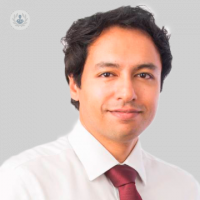Cancer treatment and heart problems
Written in association with:Can having cancer affect your heart health? New research suggests that having cancer and undergoing treatments such as chemotherapy and radiotherapy, may affect other parts of the body such as the heart, specifically its size and function. We spoke to Dr Arjun K Ghosh, a leading consultant cardiologist in London, to understand what kind of damage can occur and how you can protect your heart if you’re going through cancer treatment.

Can cancer treatment (radiation, chemotherapy, etc.) cause or worsen heart problems?
Treatments for most common cancers, such as breast, lymphoma, lung and gastrointestinal, can affect the heart. Chemotherapy, immunotherapy and radiotherapy can all have deleterious effects on the heart which may occur during treatment or even many years after completion of therapy.
The effects include problems with heart function leading to heart failure. This can cause shortness of breath, leg swelling and decreased exercise capacity, which is typically seen with breast and blood cancer treatments.
The heart’s electrical rhythm system may be affected causing palpitations, which is often seen with blood cancer treatments. Chest pain and heart attack may also occur if the coronary arteries are affected. This may be seen with gastrointestinal cancer treatments and with radiotherapy.
How can patients protect their heart during treatment?
A patient’s cardiac risk should be assessed by their oncologist before starting any treatment that has the potential to harm the heart. If the risk is elevated or there is a pre-existing cardiac disease a review by a cardiologist who specialises in reviewing cancer patients (a cardio-oncologist) would be beneficial.
The cardio-oncologist will aim to minimise the risk to the heart and facilitate the completion of cancer treatment. Patients are encouraged to adopt healthy heart behaviours during their cancer treatment to improve their overall heart health. This includes maintaining a healthy diet and exercising regularly.
Can there be long-lasting heart problems after cancer is treated?
Both chemotherapy and radiotherapy can cause long-lasting side-effects on the heart months to many years down the line after completion of cancer therapy. Heart failure, premature coronary artery disease (blockages in heart arteries) and valve disease (leaking or narrow heart valves) are well-known complications. The latter is often seen in childhood cancer survivors treated with radiotherapy.
Cancer survivors are often monitored long-term in late effects clinics to identify such cardiac complications.
How often might cancer patients see a cardiologist?
Cancer patients may be reviewed by a cardio-oncologist at any point in their treatment journey. They may need to be seen:
- before cancer treatment, if their cardiac risk is high
- during treatment, if they develop cardiac problems due to cancer drugs or radiotherapy
- after the completion of cancer treatment, if they develop late effects’ complications
The cardio-oncologist aims to allow the successful completion of cancer treatment and minimise long-term risks. Furthermore, they will want to monitor for and deal with cardiac issues if they arise post-treatment.
Dr Arjun Kumar Ghosh is an internationally recognised expert consultant cardiologist at The London Clinic and The Wellington Hospital Cardiac Unit in London. To book an appointment with him, head to his Top Doctors profile.


